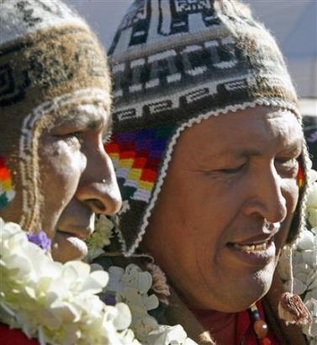Venezuelan President Hugo Chavez on Sunday bluntly accused the U.S.
ambassador to Bolivia of trying to stir up military rebellion against his
leftist ally Bolivian President Evo Morales.

Bolivian President Evo
Morales (L) and his Venezuelan counterpart Hugo Chavez chat after
finishing Chavez's broadcast of 'Alo Presidente' from Tiahuanaco, Bolivia,
May 28, 2006. Chavez on Sunday accused the United States of trying to stir
up a military rebellion against his left-wing Bolivian ally Morales.
[Reuters] |
Chavez, at the forefront of a leftist shift that is challenging U.S.
influence in Latin America, routinely trades insults with Washington, which he
blames for a short-lived coup that briefly toppled his own government in 2002.
"The (U.S.) embassy in Bolivia is already whispering in the ears of the
Bolivian military to turn them against the government of Evo Morales," said
Chavez, wearing a traditional red poncho and bead necklace, at the sacred
pre-Inca ruins of Tiwanaku high in Bolivia's Andean plateau.
"There's a plan against Bolivia, and the U.S. ambassador in Bolivia is the
head of this plan," he said during his weekly Venezuelan television show,
broadcast from Tiwanaku in front of an audience of Bolivian indigenous leaders.
No one at the U.S. Embassy in La Paz was immediately available to comment on
Chavez's accusation against Ambassador David Greenlee.
Chavez made similar comments earlier in his visit to Bolivia but did not
point the finger at Greenlee.
Morales, who sat alongside Chavez in a matching poncho, has also made vague
accusations of conspiracies against his government since taking office in
January, though he has blamed foreign companies opposed to his nationalization
drive.
Morales nationalized the impoverished country's energy industry on May 1.
Chavez signed deals to invest about $1.5 billion in the natural gas-dominated
sector on Friday, as well as a package of financing accords aimed at creating
jobs.
It was the latest salvo in a war of words between Chavez, a self-proclaimed
revolutionary and leader of the world's No. 5 oil exporter, and the government
of President Bush.
Bush said last week he was concerned about "the erosion of democracy" in
Venezuela and Bolivia. The White House has accused Chavez of being uncooperative
in fighting terrorism and of promoting instability in the region.
"Gringo go home," Chavez, a former paratrooper, said during Sunday's
broadcast, which he concluded by dancing to an Andean pan-pipe band.
He said the U.S. government was willing to pay soldiers to turn them against
the Morales government.
"The gringos offer lots of money," he said. "There are soldiers who sell
themselves to the CIA ... and they're paid by Washington."
Chavez and Morales are close allies and, with Cuban President Fidel Castro,
have formed a leftist alliance that aims to counter what they call U.S.
political and economic hegemony in Latin America.
Morales, elected on pledges to nationalize the country's energy industry,
often makes anti-U.S. comments in his speeches. But his government has
reiterated its commitment to work with the United States on issues such as
fighting drugs.
Chavez, who is running for re-election in December and seeks greater regional
integration, has used his country's oil riches to give neighbors cut-rate energy
deals and buy their debt.